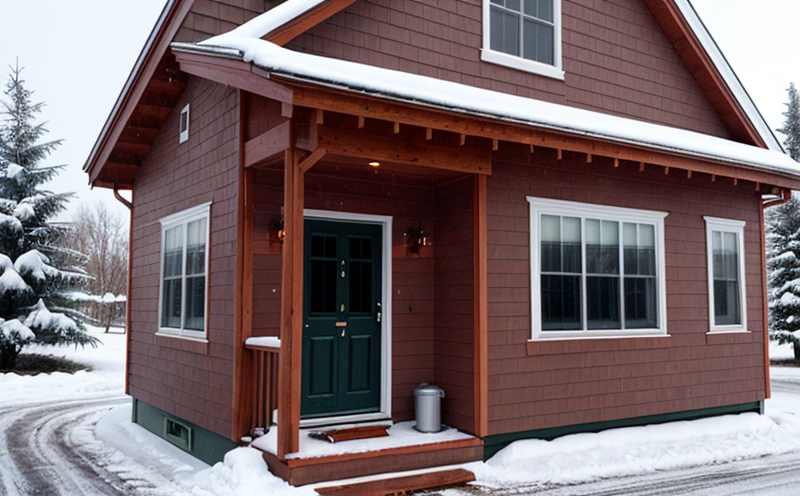ASHRAE 127 Seasonal Efficiency of DX Equipment
The ASHRAE Standard 127-2019 outlines a procedure to determine the seasonal energy efficiency ratio (SEER) and heating season performance factor (HSPF) of refrigeration equipment, including air conditioning systems. This test is crucial for HVAC manufacturers, quality managers, compliance officers, and R&D engineers as it ensures that products meet stringent energy efficiency standards set by ASHRAE.
The SEER metric is widely used in the HVAC industry to compare different models based on their seasonal cooling performance under typical operating conditions. The HSPF is equally important for assessing heating performance over a season, ensuring that systems are both efficient and cost-effective for end users. This test is particularly relevant as it simulates real-world operating conditions, providing accurate SEER and HSPF ratings.
Testing according to ASHRAE 127 involves subjecting the equipment to a series of controlled tests designed to replicate actual usage scenarios. The test setup includes an outdoor condensing unit and indoor evaporator connected by refrigerant piping. The system is placed in a climate-controlled chamber that simulates varying outdoor temperatures, humidity levels, and indoor loads.
During the test, the equipment undergoes multiple cycles of operation to ensure it operates under various conditions typical of its intended use. These cycles include cooling mode with different load settings, heating mode for HSPF testing, and idle periods to simulate real-world usage patterns. The system is monitored by sophisticated instrumentation that captures key performance metrics such as electricity consumption, refrigerant flow rates, and temperatures at multiple points within the equipment.
After completing these cycles, detailed data on energy consumption and performance are collected. This information is then used to calculate both SEER and HSPF values according to ASHRAE 127 guidelines. The results provide manufacturers with a clear understanding of their product's efficiency under typical operating conditions, allowing them to make necessary adjustments and optimizations.
The importance of this testing cannot be overstated, especially in the context of growing environmental concerns and regulatory pressures towards increased energy efficiency. By adhering to ASHRAE 127 standards, manufacturers not only ensure compliance with industry regulations but also enhance their product offerings, making them more competitive in a market increasingly focused on sustainability.
| Test Parameters | Specimen Preparation | Instrumentation Used |
|---|---|---|
| Cooling and heating cycles | Pre-assembly of components per manufacturer specifications | Thermocouples, current meters, data loggers |
| Loading conditions simulation | Calibration of all measuring devices prior to testing | Voltage regulators for accurate power measurement |
| Outdoor temperature variations | Precise alignment and positioning of equipment in test chamber | Environmental sensors for real-time monitoring |
The testing process is rigorous, requiring precise calibration of all instruments involved to ensure accurate measurement. Each step must be meticulously followed to avoid any discrepancies that could skew the results. The use of advanced instrumentation and controlled environmental conditions ensures that the test reflects true performance under actual operating conditions.
In conclusion, ASHRAE 127 testing is a vital component in the development and certification of HVAC equipment, ensuring both compliance with industry standards and superior product performance. This process provides manufacturers with valuable insights into their products' efficiency, helping them improve designs and meet market demands for more sustainable solutions.
Industry Applications
The ASHRAE 127 test is widely applicable across various sectors within the HVAC industry, including residential, commercial, and industrial settings. Its application spans a broad range of equipment types such as central air conditioning systems, heat pumps, and packaged terminal air conditioners.
| Equipment Type | Application Sector | Main Benefits |
|---|---|---|
| Central Air Conditioning Systems | Residential and Commercial | Improved energy efficiency leading to lower operational costs |
| Heat Pumps | Commercial and Industrial | Optimal performance in varying climate conditions enhancing occupant comfort |
| Residential | Easier installation and maintenance reducing downtime |
The test results are particularly beneficial for HVAC manufacturers as they provide a clear picture of their product's performance under real-world conditions. This information is invaluable in the competitive market, helping companies differentiate themselves based on energy efficiency and cost-effectiveness.
Moreover, compliance with ASHRAE 127 standards ensures that products meet regulatory requirements, opening up access to international markets where such certifications are mandatory. For quality managers and compliance officers, adherence to these standards is crucial for maintaining a strong reputation in the industry and ensuring product integrity.
Eurolab Advantages
At Eurolab, we pride ourselves on offering comprehensive testing services that meet the highest international standards. Our ASHRAE 127 testing service is no exception, providing a range of unique advantages for our clients.
- State-of-the-art facilities: Equipped with cutting-edge technology and controlled environments to ensure precise and accurate results.
- Expertise: Our team consists of highly skilled professionals with extensive experience in HVAC testing, ensuring consistent quality and reliability.
- Comprehensive reporting: Detailed reports are provided that include all relevant data points for easy interpretation by clients.
- Regulatory compliance: All tests conducted at Eurolab are designed to meet or exceed international standards, including ASHRAE 127-2019.
- Customer support: Our dedicated team is available to assist with any questions or concerns throughout the testing process and beyond.
- Timely delivery: We strive to complete tests within industry-standard timelines, minimizing disruptions for our clients.
By choosing Eurolab for your ASHRAE 127 testing needs, you can rest assured that your products will meet the highest standards of quality and efficiency. Our commitment to excellence ensures that you receive accurate results in a timely manner, setting your equipment apart in a competitive market.





